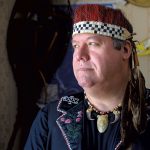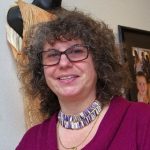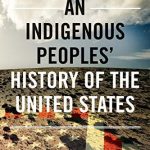CVUUS Worship
CVUUS worship opens with a ringing of the bell and saying: “We recognize that CVUUS gathers on land seized from the Western Abenaki people by European colonizers. We respect the Abenaki’s spiritual relationship to the land and waters of the Champlain Valley. We are committed to building a peaceful and more just relationship with them, and to promoting knowledge about their history and culture.”
Fuller Event Opening Language: “I want to start this event by acknowledging that we (or for Zoom, ‘most of us’) are gathered here and holding this Meeting on the unceded traditional homelands of the Abenaki people, their ancestors, and allies. Please join me in acknowledging the Abenaki community, their elders both past and present, as well as future generations. Let us not look away from the exclusions and erasures of Indigenous Peoples, including those on whose land we live, work, and witness. May we be committed to dismantling the ongoing legacies of settler colonialism here in Ndakinna – the place the Abenaki people call Our Land. Thank you.”
 Watch CVUUS worship with Abenaki Chief Don Stevens: our guest worship speaker on Feb 28, 2021 in a service led by Liam Greenwood who co-led the Native Moons Group. Go to https://youtu.be/JEPV9Mi4Mj4
Watch CVUUS worship with Abenaki Chief Don Stevens: our guest worship speaker on Feb 28, 2021 in a service led by Liam Greenwood who co-led the Native Moons Group. Go to https://youtu.be/JEPV9Mi4Mj4
Watch CVUUS worship with MUHS’ Grace Vining who, along with a Burlington student Theo Ellis Novtny, won an award for young film makers for a short film on the need for teaching Abenaki culture. This Sept 27, 2021 worship was led by Native Moons’ Liam Greenwood. You can watch the whole service here and Grace and Theo’s documentary here: https://youtu.be/WyDVh9RSgJ8.
 Watch CVUUS worship with Vera Sheehan: our guest worship speaker on Jan 21, 2024 https://www.youtube.com/watch?v=1KwLcpJgXb0
Watch CVUUS worship with Vera Sheehan: our guest worship speaker on Jan 21, 2024 https://www.youtube.com/watch?v=1KwLcpJgXb0
Indigenous Peoples Day
This was an official VT state holiday, replacing Columbus Day for the 3rd year on the second Monday in Oct. What a great opportunity to create some family traditions for honoring the original people of these hills and valleys, and other Indigenous Peoples around the world. Find at least one to do, maybe more, to tie into UU values of valuing the inherent worth and dignity of each person, and searching for the truth, and working toward a more just world. Here are a few things you might do to mark this holiday, or any time of year, from Montpelier’s Dir. of Religious Exploration Liza Earle Centers.
Abenaki Culture
Watch the Abenaki Creation Story. It is powerful to hear the Abenaki language spoken.
Keep the Abenaki language alive! Abenaki leaders are trying to teach more and more people the language.
School of Abenaki at Middlebury College Abenaki is an endangered Eastern Algonquian language and one of the three Wabanaki languages of New England and Quebec. It is spoken throughout a wide area ranging from Lake Champlain to the west and Maine to the east. You can listen to an interview with Director Jesse Bruchac and read more about the program here. The School of Abenaki launched in the summer of 2020. Their 2-week program is drawn from the Abenaki speaking community as well as beginner level students who are passionate about learning Abenaki language and culture.
Clean up our own way of speaking, to make sure we’re not spreading myths about Indigenous People or using hurtful phrases or micro-aggressions. Learn which every day phrases to leave out of our speaking here. (For some Abenaki, the phrase “Native Vermonter” can be hard to hear said by a non-Abenaki. It’s easy to just say “born in Vermont” instead.)
Learn more and support indigenous authors. Consider buying or borrowing books by indigenous authors: some picture books or some for youth/young adults. Peruse the CVUUS Library reading list: https://www.cvuus.org/learning/library/reading-lists-2/native-american-perspectives/
A land project: Abenaki have always been and continue to be stewards of the land. Spend some time in nature, connecting with the Earth. You think of a project you could do to care for the land the way it cares for us–plant a tree or bush, pick-up trash, get a bird feeder for the long winter ahead.
Feast with some of these traditional Abenaki foods. ??You might want to include several of these in a meal: squash, corn, beans, pumpkin seeds, popcorn, berries, sunflower oil, fish or a dessert with maple syrup! Here’s an article about a local Abenaki chef.
Celebrate: Some good news: just in the last month, a bill passed the VT State legislature that place name signs within VT State Parks will include the Abenaki name for a place along with the English name (if the Abenaki place name is known).
Watch Dawnland, a documentary done in and about Maine and its Indigenous Peoples and the work of a Truth and Reconciliation Commission established by the Chiefs of the Wabanaki Confederacy and the State of Maine.
Abenaki Heritage Weekend: Maritime Museum in Vergennes every June
The Vermont Abenaki Artists Association sponsored the annual Abenaki Heritage Weekend June 29-30 at Lake Champlain Maritime Museum on June 29-30 . It was a vibrant celebration of Abenaki art, culture, and heritage and happens.

Visitors talked with artists and watched crafting in the Native Arts Marketplace of the Vermont Abenaki Artists Association. VAAA’s Waolowzi Health and Wellness committee partnered with Open Door Clinic and the Vermont Department of Health, which hosted a pop-up clinic on-site all weekend offering check-ups, referrals, and advice.
A new special Abenaki exhibit, Deep Roots, Strong Branches, is now on view in the museum’s Schoolhouse Gallery and will be on view all season. As Abenaki curator and friend of CVUUS Vera Sheehan said, “Abenaki culture is a complex network of people, places, relationships and ceremonies that link the people with the living land. The exhibit contains selected artwork and stories by contemporary American Abenaki artists that illustrate the resilience of the region’s Indigenous people.”
This heritage weekend brings together citizens of the Elnu Abenaki Tribe, the Nulhegan Band of the Coosuk Abenaki Nation, the Koasek Traditional Band of the Koas Abenaki Nation, and the Missisquoi Abenaki Tribe. More here.
CVUUS Share the Plate Donees
Vermont Abenaki Artists Assn. promotes regional Indigenous arts, artists, and culture by providing an organized central place to share creative ideas, and professional development. It creates engaging cultural events, educational programs, exhibitions, and curriculum materials and represents over 280 artists, teaching artists, performers, educators, and scholars. We’ll collect for them in the first half of March. For more, visit abenakiart.org.
Abenaki Helping Abenaki’s mission of the Nulhegan Band of the Coosuk Abenaki Nation is to strengthen our government; to build our community, and ensure sustainability; to protect our customs and traditions; and to revive our culture and celebrate our heritage while sharing it with those around us. N’dakinna (our homeland) is nestled among the lakes, rivers, and forests of Vermont’s Northeast Kingdom. Our connection to this land cannot be described in any language. It is our birthright and obligation to advocate for our ancestral territory so that its uniqueness and beauty will be protected for the generations to come. Look for displays at Burlington International Airport, Echo Museum, and Ethan Allen Homesite. We’ll collect for them in the second half of March. For more, visit abenakitribe.org
Native Moons and Natural Mindfulness Group
This small group ministry started by Liam and Mike Greenwood in 2020 aimed at celebrating the Abenaki and Iroquois lunar cycle. They were an informal group who began by reading chapters of Braiding Sweetgrass by Robin Wall Kimmerer and held discussions to share our reflective writings on these chapters over Zoom. We also offered some outdoor activities. This group was open to anyone.
Zooming on the Full Moon (although in-person clustering was smiled upon). The Native Moons Book Group learned about Abenaki history more deeply and more intimately. They discussed Aunt Sarah, Woman of the Dawnland. This biography by Trudy Ann Parker is of Trudy’s great aunt Sarah, who lived to be 108 years old. Her journey from the 1820’s to the 1930’s within the State of Vermont is a slow loss of indigenous culture and rights, and a complex relationship with the dominant settler culture.
CVUUS Worship Service Presentation Slides honor the full moon cycle and signs remind us that we are worshiping on the lands of the Abenaki people.
350VT Leaders Land Acknowledgement by Lindsey Berk (July 2023)
Good evening,
Tonight, we are gathered virtually across a region now known as Vermont, also known as Ndakkina, or the dawnland, by the Abenaki, the original stewards of this land.
I am speaking to you from the lowlands of the Champlain Valley, at the foothills of the Green Mountains. In a town we now know as Brandon, but was once called Neshobe. Neshobe is an Abenaki name that translates to “full of water.” In 2011, Hurricane Irene swelled the Neshobe River, forcing her crushing powers onto the buildings of downtown Brandon, destroying much manmade infrastructure. She has since been diverted to flow around buildings and under roads to meet the windy Otter Creek, who will together eventually join Lake Champlain, or as the Abenaki know it, the Lake Between, with a destiny of journeying to the great Atlantic Ocean.
Last week, a different variation of water and wind appeared on our doorsteps and taught us once again the power of mother nature. Our state capital, our main city center and various towns along the spines of our mountains and banks of our rivers have experienced unexpected rising waters where they were not welcomed. But water heeds no attention to the expectations of us mere mortals.
Water is the sacred element that comprises 70% of our planet, and a parallel amount exists within our own bodies. We live in it, and it lives within us. Water has the power to birth life, and the power to take it away. Water regulates our body temperature, it converts food to elements needed for our survival, it replenishes parched soils, it carves stone, and, as we collectively witnessed last week, it can move roads, homes and earth.
The Abenaki understood the power of water, something we are re-learning ourselves in real time. The Abenaki are still here, still hunting, fishing, foraging, weaving, laughing, dancing, praying, surviving and thriving, despite forced assimilation and migration, and the state’s denial of their existence. They are still here, remembering how to be in right relation with the rivers and lakes, white cedar, red maple, with the migrating geese who give us the gift of seeing their continental flights twice a year, with all our two-legged, four-legged, winged, finned, rooted and non-rooted relations, as well as with the land, AND water, of who we are one. The Abenaki are still here, and I join them, and invite fellow settlers on this land, to honor the land and water, and work to protect them against the ongoing extractive economy. I invite you to be in community that respects the sacred elements and celebrates the wonders that are here.
Join me as I give thanks to the land, water, fire and air, and this land’s original stewards, as we progress through this chaotic summer season, with drenched fields and gardens, sodden memories, heavily flowing waterways and equally heavy hearts.
Thank you.
THANKSGIVING? GIVING THANKS?
I can’t celebrate Thanksgiving anymore. The racist and violent white supremacist roots of it are too awful. There are many things to do instead and here’s what I’m hoping to do: a big family meal, donating money, a land acknowledgement, and sharing information about the origins of “Thanksgiving” with the people at our meal and the wider community. Is this enough? Probably not but it’s what I have come up with for this year. We aren’t going to call it Thanksgiving, to separate it from the original holiday. It’s really important to do something to concretely support the Vermont Abenaki community, not just in words, so we are donating to them HERE (scroll to the bottom). Here’s a useful article: 9 Ways to Decolonize and Honor Native Peoples on Thanksgiving – culturalsurvival.org and a powerful very short video from Teen Vogue. Watch before showing kids: Native American Girls Describe the REAL History Behind Thanksgiving (1:43 min)
From Poppy Rees, Dir. of Religious Exploration

